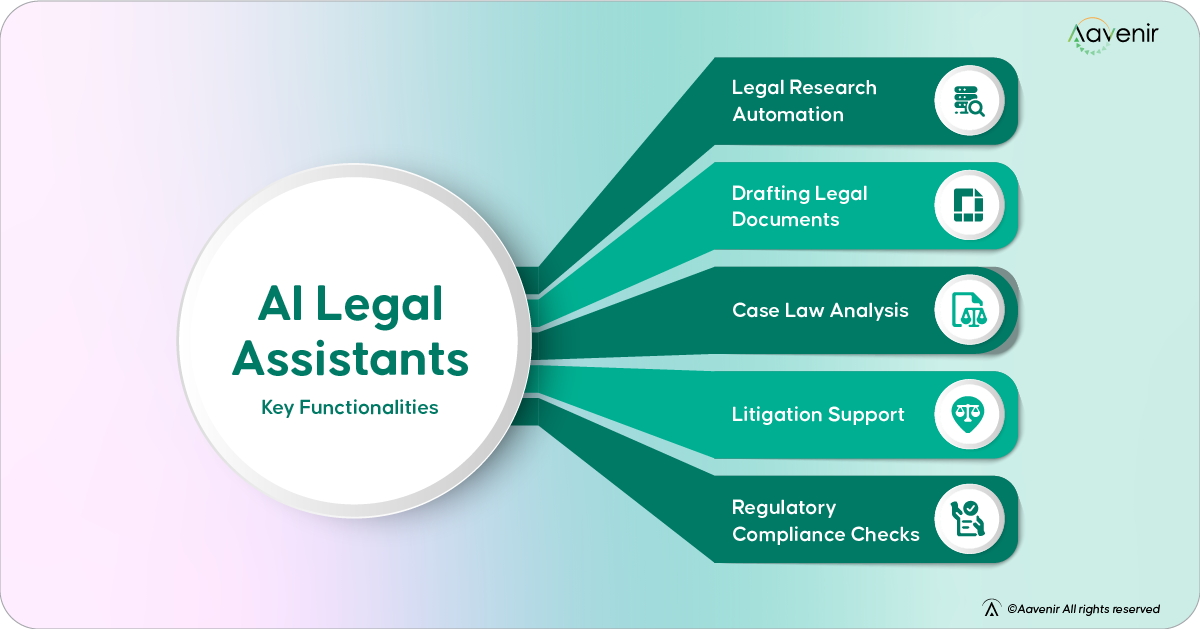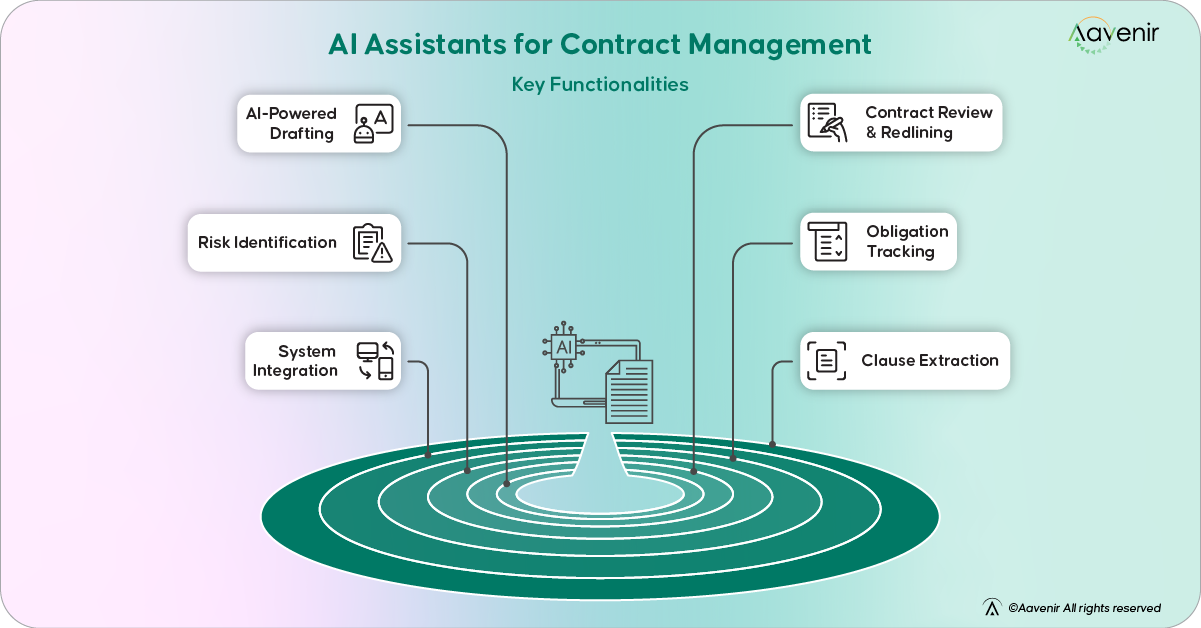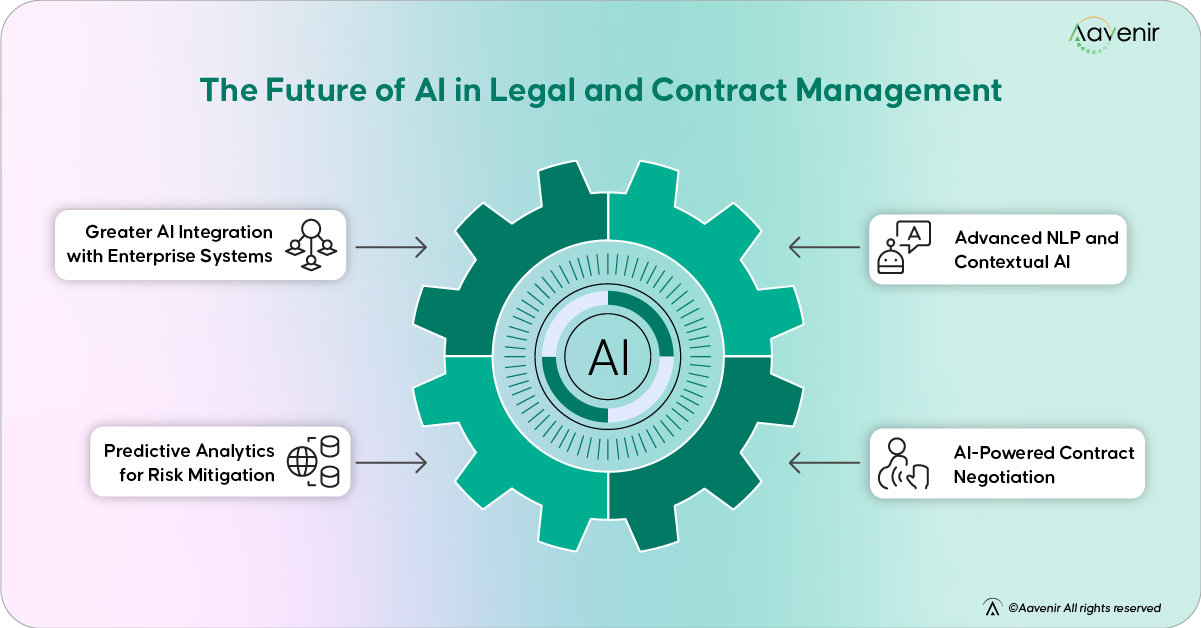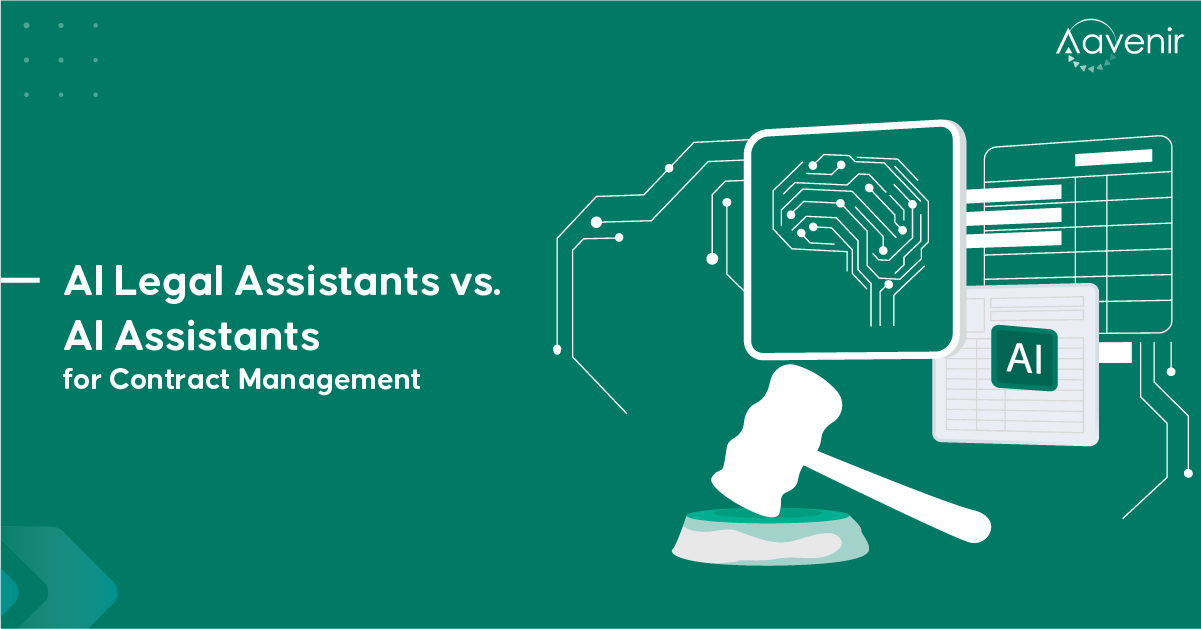The rise of Artificial Intelligence (AI) in legal and contract management has been nothing short of revolutionary. AI has significantly transformed how legal, procurement, and finance teams operate, from automating tedious tasks to enhancing decision-making.
However, there is often confusion between AI Legal Assistants and AI Assistants for Contract Management. Many professionals mistakenly believe they serve the same function, leading to misconceptions that can hinder AI adoption and slow down digital transformation efforts.
This blog will debunk the myths and highlight the key differences between AI Legal Assistants and AI-powered Contract Management tools, helping enterprises make informed decisions.
How AI Legal Assistants and AI for Contract Management Differ in Functionality
Understanding AI Legal Assistants
AI Legal Assistants are AI-driven tools that support legal professionals by automating research, drafting, and compliance-related tasks. These assistants use natural language processing (NLP) and machine learning to analyze large volumes of legal texts and provide insights that expedite decision-making.

Key Functionalities
- Legal research automation – Analyzing legal texts, statutes, case laws, and regulatory frameworks to provide quick and accurate research insights
- Drafting legal documents – Automating contracts, agreements, and pleadings, reducing manual work for lawyers
- Case law analysis – Extracting relevant precedents for legal cases, helping lawyers strengthen their arguments
- Litigation support – Assisting lawyers with case preparation by summarizing legal documents and identifying key arguments
- Regulatory compliance checks – Identifying potential risks and ensuring adherence to state, federal, and international laws
Who Uses AI Legal Assistants?
- Law firms
- Corporate legal departments
- Compliance teams
- Government agencies
Real-World Use Cases
- A corporate legal team leveraging AI for compliance tracking and regulatory updates, ensuring that all contracts meet legal and industry standards.
- A compliance team using AI-powered tools to scan contracts for non-compliance risks before submission.
Understanding AI Assistants for Contract Management
AI Assistants for Contract Management are specialized AI-powered tools that streamline contract lifecycle management (CLM), improving efficiency, compliance, and risk mitigation. Unlike AI Legal Assistants, which focus on broader legal functions, AI-driven CLM tools are designed to manage contracts throughout their lifecycle —from drafting and negotiation to execution, monitoring, and renewal.

Key Functionalities
- AI-powered contract drafting – Automating contract creation based on templates, pre-approved clauses, and industry best practices
- Contract review and redlining – Identifying discrepancies, obligations, and compliance risks before finalization
- Risk identification and mitigation – Detecting clauses that may lead to disputes or financial risks, ensuring contracts are structured optimally
- Obligation tracking and compliance automation – Ensuring all contractual obligations are met on time through automated alerts and reminders
- Integration with procurement, finance, and sales systems – Connecting contracts with enterprise workflows to improve visibility and efficiency
- AI-powered clause extraction – Automatically identifying key clauses, such as indemnification, payment terms, and force majeure, for quick reference and comparison
Who Benefits from AI Assistants for Contract Management?
- Legal teams
- Procurement professionals
- Finance departments
- Sales teams
- Compliance officers
Real-World Use Cases
- A procurement team using AI to identify risks in supplier contracts before signing, reducing the likelihood of disputes
- A finance team automating contract renewals to avoid missed deadlines and financial penalties
- A sales team using AI-driven contract review tools to speed up deal closures by reducing legal bottlenecks
- A law firm using AI to automate contract drafting and minimize human errors, reducing the time spent on manual document creation by 50%
Common Myths About AI in Legal and Contract Management
Myth #1: AI Legal Assistants and AI for Contract Management are the same.
Fact: AI Legal Assistants support broad legal functions, while AI Contract Management focuses specifically on optimizing the contract lifecycle
Myth #2: AI can replace lawyers and contract managers
Fact: AI enhances efficiency but cannot replace human judgment, negotiation skills, and strategic thinking. AI is a tool that complements legal professionals rather than replacing them
Myth #3: AI works the same across all contract types and industries
Fact: AI tools require customization based on industry-specific regulations, contract structures, and company policies to ensure accurate analysis and compliance
Myth #4: AI-driven contract management is only useful for legal teams
Fact: Procurement, finance, sales, human resource, and compliance teams also benefit significantly from AI-powered contract insights, making contract management a cross-functional effort.
Key Differences Between AI Legal Assistants and AI for Contract Management
| Feature | AI Legal Assistants | AI for Contract Management |
| Focus Area | Legal research, litigation, compliance | Contract lifecycle, negotiation, obligations |
| Primary Users | Lawyers, legal teams | Procurement, finance, legal, sales, compliance |
| Core Capabilities | Legal document drafting, case analysis, research | Contract drafting, Contract analysis, Contract review, risk assessment, automation, tracking |
| Industry Adoption | Law firms, corporate legal teams, regulatory bodies | Enterprises managing high contract volumes, procurement teams, sales teams |
AI for Contract Management: A Must-Have for Modern Enterprises
How AI Enhances CLM Efficiency
- Reduces time spent on contract review and approvals, enabling businesses to finalize agreements faster
- Minimizes legal risks by identifying problematic clauses and providing data-driven insights for negotiation
- Ensures compliance with contractual obligations, regulatory requirements, and internal policies
- Improves contract visibility by integrating AI-driven analytics into enterprise workflows
Why AI-Powered CLM Is Essential
- Companies dealing with loads of contracts need automated help to manage complexity and keep things uniform
- AI-driven CLM makes sure contracts match business aims while cutting down on money and rule-breaking risks
- Buying and money teams gain from up-to-the-minute contract insights letting them make smarter choices
- AI-powered contract management speeds up deal cycles and boosts teamwork between legal, sales, and finance departments
The Future of AI in Legal and Contract Management

- Greater AI integration with enterprise systems – AI-driven contract management tools will link up more with procurement, ERP, CRM, and financial systems
- Advanced NLP and contextual AI – Making AI better at grasping contract subtleties, spotting hidden risks, and offering negotiation ideas
- Predictive analytics for risk mitigation – AI-based insights will help companies tackle contract risks before they grow
- AI-powered contract negotiation – Future AI tools will help with live contract negotiations by giving data-backed tips on changing clauses
Synopsis
The difference between AI Legal Assistants and AI-powered Contract Management tools matters a lot to companies that want to boost productivity follow rules, and handle risks better. AI Legal Assistants help with research, court cases, and following regulations. On the other hand, AI for Contract Management changes how businesses deal with contracts making sure they run and spot problems before they happen.
AI-driven CLM solutions like Aavenir offer unparalleled efficiency, compliance, and risk reduction for enterprises looking to streamline their contract management process. Want to see how AI can transform your contract processes? Schedule a demo today!
FAQs
1. Can AI Legal Assistants be used for contract management?
AI Legal Assistants are designed primarily for legal research, case law analysis, and compliance-related tasks. While they may assist with contract drafting and review, they lack the specialized features of AI-powered contract management tools, such as obligation tracking, contract automation, and real-time risk assessment.
2. How do AI Assistants for Contract Management improve business efficiency?
AI-powered contract management tools streamline contract drafting, automate review processes, track obligations, and provide risk insights. By reducing manual effort and improving accuracy, they help legal, procurement, finance, and sales teams save time, reduce risks, and enhance compliance.





